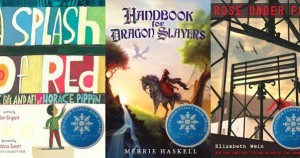
Interview with April Henry about Girl, Stolen
April Henry’s main character in Girl, Stolen is a well-researched, well-written example of blindness, and we were thrilled to discuss the book with her.

April Henry’s main character in Girl, Stolen is a well-researched, well-written example of blindness, and we were thrilled to discuss the book with her.

s.e. smith’s rave review of Wild Awake was one of the very first posts on this blog. We invited s.e. and author Hilary T. Smith to discuss books, mental illness, and everything in between.

We’ve been wanting to shake hands with the good folks of the Schneider Family Book Award–an ALA award which highlights depictions of disability in children’s literature–for a while, and July 2014 marked the perfect time: while we celebrated our first anniversary, the Schneider celebrated its tenth!
If our contributors could tell an author writing a character with their disability one thing–besides “do your research”–what would it be?

The toughest chapter to write in El Deafo, by far, was the chapter in which I reject sign language.

Shaunta Grimes’s Viral Nation is the rare YA dystopian novel with an autistic protagonist; we were keen to sit down with the author to discuss the book, its sequel Rebel Nation, and its protagonist Clover Donovan.
Is any representation better than no representation? That argument frequently comes up in response to criticism, but is it valid?

A one-armed astronaut superhero is the lead in Dangerous, the unusual new novel by NYT bestselling and Newbery Honor-winning author Shannon Hale, who sat down with us for a great interview.
It’s hard to believe, but it’s been a whole year since Disability in Kidlit was first launched. We’re so excited for this milestone and so grateful for all of your support.

What’s so wrong with the Beautiful Tragedy trope? Why is it wrong to emphasize the supposed irony of a person with beautiful eyes who can’t see or a good-looking person “confined to a wheelchair” (another horrible, tragedy evoking phrase) or the like?